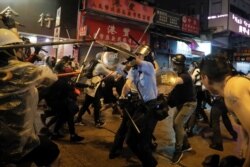Hong Kong police have engaged in routine and systematic abusive treatment of protesters and residents throughout the three months of anti-government protests, according to a human rights organization's report released Friday.
Researchers with Amnesty International said they found many instances of reckless, violent and indiscriminate policing since the mass protests burst onto city streets June 12.
Interviews by Amnesty of people who had been arrested and their lawyers revealed that police used violence most often before and during arrests. In several cases, detained protesters were also severely beaten in custody and suffered ill treatment amounting to torture.
'Apparent thirst for retaliation'
"In multiple instances, the abuse appears to have been meted out as 'punishment' for talking back or appearing uncooperative," the report said.
"The evidence leaves little room for doubt: in an apparent thirst for retaliation, Hong Kong's security forces have engaged in a disturbing pattern of reckless and unlawful tactics against people during the protests," Nicholas Bequelin, East Asia director at Amnesty International, said in a prepared statement. "This has included arbitrary arrests and retaliatory violence against arrested persons in custody, some of which has amounted to torture.
"Given the pervasiveness of the abuses we found, it is clear that the Hong Kong Police Force is no longer in a position to investigate itself and remedy the widespread unlawful suppression of protesters," he said.
The NGO demanded a prompt, independent investigation into the allegations.
Investigating the police tactics is also one of the key demands of protesters, who are moving into their 15th week of massive organized marches and clashes against the government. The protests initially focused on stopping a bill that would have allowed people to be extradited from Hong Kong to mainland China. The rallies and marches have since come to encompass broader demands for such things as democratic elections.
The city's chief executive, Carrie Lam, has repeatedly insisted that police have used acceptable force while dealing with protesters who have set fires and thrown Molotov cocktails as police use tear gas, water cannons and rubber bullets.
Lam has said several times that that there is a proper mechanism for citizens to file complaints. But many Hong Kongers say they have been thwarted from filing complaints because officers have hidden their identity numbers. What's more, residents say they do not trust that Hong Kong police have the professional subjectivity to investigate themselves.
'High degree of restraint'
In a statement posted on their Facebook page Thursday, Hong Kong police wrote: "In the face of the illegal violations of the protesters, the police have always maintained a high degree of restraint in order to restore order and the safety of the public."
In a response to questions from VOA, Hong Kong police said: "There are also stringent police guidelines for the use of force, and the force to be used by Police shall be the minimum force necessary for achieving a lawful purpose. ... Police respect the privacy, dignity and rights of the person under police custody and have a set of standard procedures in handling persons in police custody."
The Amnesty report, drawn from more than two dozen interviews with people arrested and attorneys, concluded that Hong Kong police used excessive force, randomly targeting and engaging in torture and degrading treatment of those in detention.
Police also delayed access to medical care and counsel for those who had been detained. They found a pattern of arbitrary arrests, including cases in which residents and bystanders have also been swept into custody.
In the study, Amnesty broke down the problems into a few major categories: excessive force during arrest; allegations of torture and cruel treatment in detention; delayed access to health care; delays in giving access to counsel; and arbitrary arrests.
Beatings described
Researchers said they documented several instances when police officers used "unnecessary and excessive force" in arresting protesters. Almost every person who had been arrested described being beaten with batons and fists, even when the protester said he or she did not resist. One man was hospitalized for two days with a fractured rib and other injuries.
The researchers also found several cases in which police denied or delayed access to lawyers and medical care to those arrested. Of the 21 arrested persons interviewed by Amnesty, 18 were admitted to a hospital either for injuries or illness related to their arrest and detention.
One suspect was pinned to the ground in a police station; an officer pried open the man's eye and shined a laser penlight into it. The detained man was later hospitalized for several days with a broken bone and internal bleeding.
No medical care for some
Researchers found that several suspects did not receive medical care, even though they were bleeding or complained of injuries. One man was dragged on pavement and held in a police station for seven or eight hours, barred from wiping blood and dirt from his buttocks, according to the report. He ultimately stayed more than a week in a hospital with multiple injuries to his face and body.
Yet another man received multiple fractures to his arm during his arrest in August, Amnesty reported. Police denied him permission to be taken to a hospital for more than five hours, during which time his hands were zip-tied behind his back.
Several people arrested had to wait several hours or as long as half a day to speak with attorneys, despite repeated requests made by the arrested persons and repeated requests by lawyers at detention centers, according to the report.






